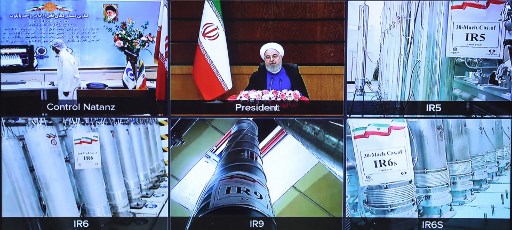
President Hassan Rouhani officially inaugurated the cascades of 164 IR-6 centrifuges and 30 IR-5 devices at Iran’s Natanz uranium enrichment plant in a ceremony broadcast by state television. (Photo by – / Iranian Presidency / AFP)
TEHRAN, Iran (AFP) — Iran said Friday it has begun producing uranium at 60 percent purity, in another breach of its commitments to the international community which is concerned about its nuclear programme.
The Islamic republic had declared it would sharply ramp up its enrichment of uranium on Tuesday, two days after an attack on its Natanz nuclear facility that it blamed on arch-foe Israel.
The incidents cast a shadow over talks in Vienna aimed at salvaging the 2015 nuclear deal between Iran and world powers that then US president Donald Trump abandoned almost three years ago.
Ali Akbar Salehi, head of the Atomic Energy Organization of Iran, confirmed Iran was now producing uranium enriched to 60 percent purity, taking the country closer to the 90 percent level required for use in a nuclear weapon.
“The enrichment of uranium to 60 percent is underway at the Martyr Ahmadi Roshan nuclear facility” in Natanz, he said, quoted by Tasnim news agency.
“We are now getting nine grams (almost a third of an ounce) per hour,” Salehi said later on state television.
Iran has repeatedly insisted it is not seeking an atomic bomb, but at that rate of production, it could take the Islamic republic 322 days to produce the amount of 60 percent enriched uranium needed in any later step to make one bomb, based on the International Atomic Energy Agency’s criteria.
But this would require Iran to have a sufficient amount of 20 percent enriched uranium, which it does not have, according to the latest IAEA data.
Tehran has gradually rolled back its nuclear commitments since 2019, a year after Washington withdrew from the accord and began imposing sanctions.
The 2015 deal known formally as the Joint Comprehensive Plan of Action, or JCPOA, gave Iran relief from sanctions in return for curbs on its nuclear programme.
Under the accord, Iran had committed to keep enrichment to 3.67 percent, though it had stepped this up to 20 percent in January.
Negotiations aimed at ensuring the return of the United States to the JCPOA and the lifting of sanctions resumed this week in Vienna.
‘Positive’ nuclear talks
Russia’s ambassador to the UN in Vienna, Mikhail Ulyanov, tweeted after the latest round of talks on Thursday that the “general impression is positive”.
The head of the Iranian delegation, Abbas Araghchi, was more cautious at the end of the meeting.
Araghchi stressed Iran wanted to avoid the talks “dragging on” and that they had to “take place in a well-defined framework and within an acceptable time period”.
He also stated that the planned rise in enrichment levels was in order to “meet some of the country’s medical needs”.
The European Union has rejected this argument.
“There is no credible explanation or civilian justification for such an action on the side of Iran,” EU foreign policy spokesman Peter Stano said Friday, referring to Iran’s latest enrichment move.
“But this is exactly why we are involved and engaged so much in the talks… to make sure that we go back from such steps,” he told reporters in Brussels.
The talks involved delegations from the remaining parties to the JCPOA following the US pullout — Britain, China, France, Germany and Russia as well as Iran.
Iran says the step is a response to Israel’s “nuclear terrorism” after an explosion knocked out power at its Natanz enrichment plant on Sunday.
Israel has neither confirmed nor denied involvement, but public radio reports in the country said it was a sabotage operation by the Mossad spy agency, citing unnamed intelligence sources.
A senior EU official said both the Natanz attack and Iran’s enrichment move “make the negotiation a bit more difficult”.
“The one thing is that we are closer than last week — this is definitely the case,” he said. “We are reaching a point in which the decision capacity… is back to capitals.”
© Agence France-Presse








